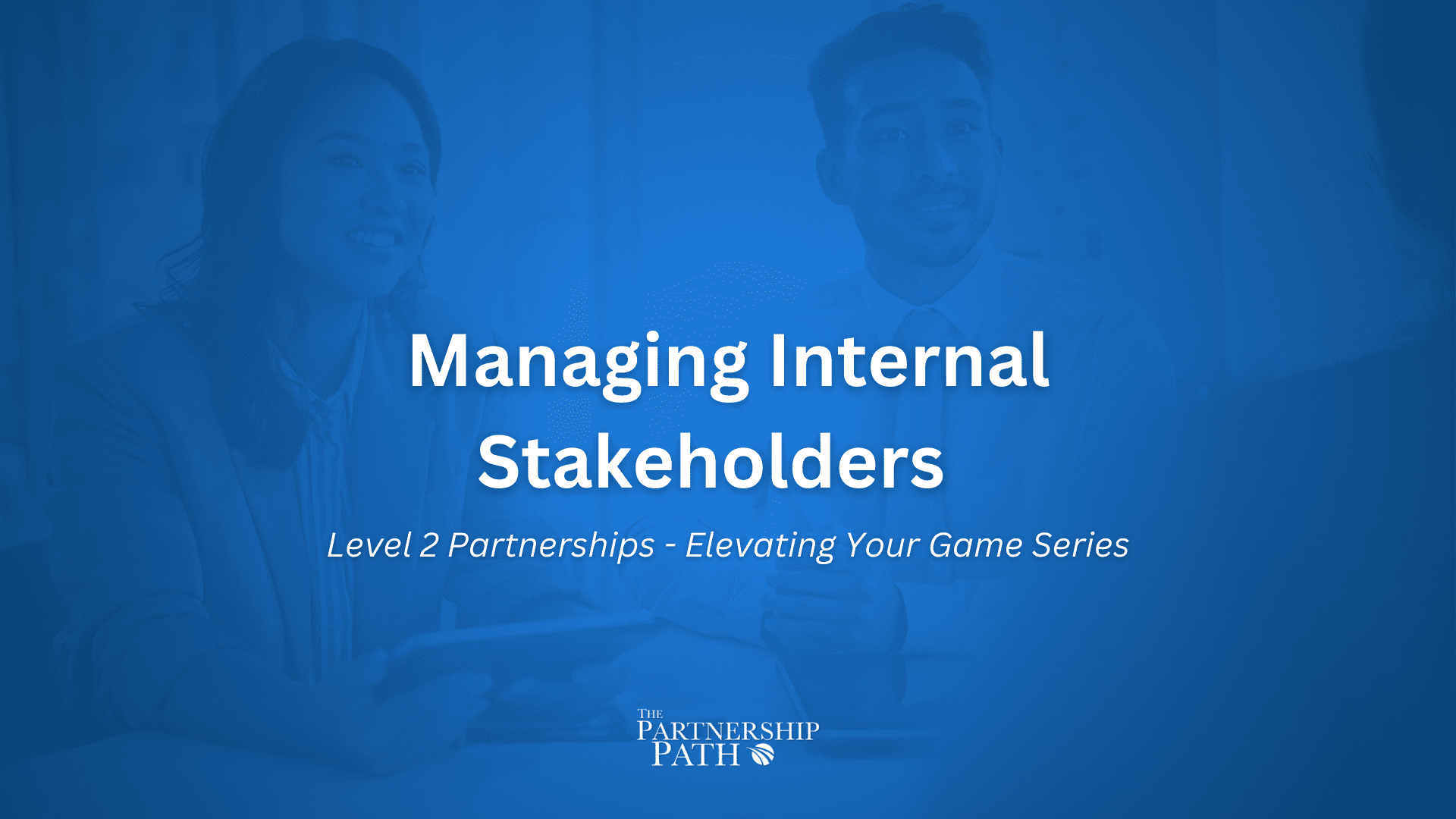Main Episode
Co-Marketing With Partners
Episode Summary
In this episode, hosts John and Toni celebrate their podcast’s recent recognition as one of the best in channel partnerships! They discuss the complexities of co-marketing, explaining why it’s a tricky but vital part of any partnership strategy, regardless of the partners’ size and marketing maturity. Sharing their own experiences, they offer actionable advice for anyone looking to improve their marketing collaboration efforts.
Key Takeaways
- Understanding Your Partner’s Marketing Maturity: Co-marketing varies greatly depending on the size and marketing sophistication of your partner. Tailor your approach accordingly.
- Segment Your Marketing Efforts: Marketing can be divided into three stages—awareness, interest, and action. Ensure your campaign matches the audience’s stage.
- Transparency is Key: Both sides should openly discuss their marketing capabilities and limitations to create a campaign that plays to each other’s strengths.
Why this Video is Valuable
This video is perfect for anyone involved in managing partnerships, especially channel or partner managers, looking to improve their co-marketing strategies. It emphasizes the importance of understanding your partner’s marketing capabilities and how transparency and communication are key to successful campaigns. If you’re navigating the challenges of creating joint marketing campaigns that deliver results, this discussion is full of practical insights.
Transcript
John: Hey Toni!
Toni: Hi, John.
John: How are you doing today?
Toni: Very well, thank you. Sun’s been shining here, so it’s a good day.
John: That’s awesome. That’s awesome. I’m kind of excited today because I just saw a notice from Canalis. I can’t, I’m not sure I know exactly how to pronounce that, but you know, Jay McBain, big partner ecosystem guy. And our podcast was in his list of some of the best channel partnership podcasts in the market.
Toni: Yeah?
Toni: Wow! Okay, so my good day has just got even better. Wow!
John: Yeah. So we’re famous. Yeah. I know that’s kind of cool. Yeah. So I just thought I should call that out to you because I’m not sure our listeners know that the reason we’re doing this is a lot because of you, because I came to you with some ideas on, you know, writing and some of that kind of stuff. And you’re the one who said, hey, maybe we should do a podcast. And so I wanted to say thanks to you because…
Toni: That is, wow. Oh.
Toni: Yeah.
John: Now we’re on a list of best podcasts in the industry. I think that’s pretty cool.
Toni: Actually, like a little bit emotional. Oh thanks, well I wasn’t expecting that today. Okay, what else are you going to throw at me, John?
John: No, that’s it. That’s it. It was just top of mind because I saw that it was last week. I saw that post and I was kind of excited about it. So I wanted to make sure and give a little shout out to Toni Kent as the podcast creator. So anyway, thanks.
Toni: Okay.
John: I thought today we would talk about marketing with partners. In this series on go to market, the very first one in that series, I thought we would kind of focus on where it all starts. So, you know, how do we go to market with a partner? How do we co-market with our partners? And that’s a complicated task.
Toni: Yes. Yeah. Yeah.
Toni: It is. And I think if we’re talking about partnerships and managing partnerships, something that we talk about a lot is selling together and there’s a lot of emphasis on pipeline and deals, and that relationship with marketing is really important. And I think sometimes people struggle to make that fit within the way they work with their partners.
John: Yeah. Well, my experience is that it’s drastically different depending on the size of the partner that you’re partnering with, right? Like some of your experience when you were at Microsoft, you were working with some really big partners who had a really mature marketing department. And then you were, I think, working with some smaller organizations that…
Toni: Yeah.
Toni: Yeah.
John: …didn’t really even know what marketing was. Was that true in your experience?
Toni: Yeah. And I think you’ve got that mix of there may be some organizations that have a marketing manager, but they’re required to do absolutely everything and need a lot of help handholding. They will be really open and receptive to whatever assistance you can give them, whether that’s templates or telemarketing or budget, always budget.
And then you have other organizations that are mature and will have a whole marketing division with some very clear ideas and goals about how they want their brands to be perceived. So yeah, a mix.
John: Well, and this is also just from my experience in working with the partner managers, the channel managers, and my customers too. My experience is that a lot of channel management people, partner management people, aren’t really marketing experts either. And so it’s an area of uncomfortableness on both sides, right? We’ve got the partner for a smaller partner, maybe, who isn’t as comfortable with marketing or is overwhelmed with marketing.
Toni: Yeah.
Toni: Yeah.
John: And then we’ve got a channel manager or a partner manager who doesn’t really know what good marketing looks like. And so it can be a recipe for disaster if it’s not managed well. What kind of, I’m always curious, Toni, about you. What kind of background did you bring in when you were a channel manager? What kind of background did you have in terms of marketing? Was that something that you were familiar with, kind of comfortable with?
Toni: Yeah. Um, I’ve worked very closely with marketing teams. I had done telemarketing myself, so I’d been on the phones. And I’d also worked in roles where I had been very close, well, I reported into the marketing function, been involved in campaign design, written copy. So I think, yeah, as somebody who likes to create content and always has done, I think there were…
John: Okay. Yep. Yep.
Toni: …maybe skills that I had that meant that when the marketing team asked something of me, I’d go, yeah, I get how to translate that into something a partner can use versus some other colleagues who may be much better at helping to close a deal, manage a pipeline, who would have looked at the marketing email and gone, nah, push that to the side.
John: Right. Yeah.
John: Yeah. Well, I think that puts you above a lot of the people that we come across in the training that we do, which is great. I think when I think about my advice to channel managers and partner managers on co-marketing with partners, it starts with that transparency, right? What’s your background? What do you really know? What don’t you know? And for them to do the same, right? Of, hey, here’s what I’m comfortable with, here’s what I understand, or here’s what I’m overwhelmed with, so that you can kind of meet each other in the middle. So how do we do really good marketing together for whatever this solution is that we’re trying to take to market together? And I think that involves really being clear on what we’re trying to do. And here’s what I mean by that. I think most…
Toni: Yeah.
John: …marketing people would divide marketing into three phases, right? There’s the “people don’t know who we are,” and so what we’re doing is just trying to make people aware that we exist. Then there’s people who have raised their hand, who have said, “Oh, what you just said is mildly interesting to me, and I might want to know something about it.” And that requires a different kind of marketing.
Toni: Yeah.
Toni: Mm-hmm.
John: And then the third phase is people who say, “I have that problem. I need to solve that. Help me, you know, give me more information about it.” Right? Like there’s three levels of engagement that the customer goes through. And I think where a lot of partnership marketing falls down is we do the wrong one of those three things, right? Like we always do step three.
Toni: Mm-hmm. Yeah.
Toni: Mm-hmm.
John: Like we assume everyone knows who we are and is interested, so we’re just doing that. Or we only do step one, where it’s only awareness stuff. And I think that’s kind of that balancing act that’s really hard between two companies who oftentimes have marketing departments at two very different levels trying to resolve. I don’t know, does that make sense?
Toni: Yeah. Yeah. And I think, um, it’s quite interesting because one of the biggest challenges that I still come across today is people need content. And a lot of decision-makers now do not wish to engage with a salesperson. I think it’s a Gartner stat until they’re something like 70% along the decision-making process and they prefer to do their research digitally. So you need to have marketing assets like case studies, use cases, product capabilities, podcasts, that a salesperson or partnership manager could seed with their partners to share with end-user customers. So I think if we consider our marketing function as part of that sales process and a sales enabler,
you know, we should be thinking about how they can make the partnership smoother. How can what they produce help our partner to get better results? Um, yeah. And there is, you know, there’s a lack of content, and the place where you can get content from is going to be your marketing team.
John: Yeah, for sure. And everything you just described fits into that third bucket, right? Where someone is actively looking for a solution to a problem that they know they have, right? So they’re problem aware and potentially solution aware. And I do think the challenge that we have in that corner or that segment of marketing is making that content—like if I’m the vendor—making that content that I have that meets that need relevant for the partner. Because the content I have is specific to just me and not the partnership, right? So it markets my stuff, but not my partner’s stuff. And so we need to work with that material to make it fit.
Toni: Mm-hmm.
Toni: Yeah.
John: For what we’re trying to do with the partner. That’s not easy to do, is it?
Toni: Hmm. Yeah. No, unless you’ve got, so I guess the question is always, can I co-brand it? Can I white label it? Can I change it? Yeah.
John: Can I change it? Right.
Toni: Yeah. Yeah.
John: And I think that the classic example of this is, you know, the vendor has a software solution and the partner is providing services, right? So the vendor’s marketing content is talking all about the product. Here’s what the product does. Here’s the great things about the product, but it never talks about what the partner’s services are and how they fit with the product. And so then the partner’s like, well, how am I supposed to use this? Because it’s not really relevant to me. It doesn’t tell my story. And it’s difficult to make that fit, I think.
Toni: Yeah. And I think that comes back to understanding your partnership well enough to bring those things together into a campaign that will work for both of you.
John: Totally. Yeah, I totally agree with that. And I think it starts with, are we marketing to people who already know they have a problem and we just need to tell them that we can solve it? Or are we marketing to people who don’t even know they have a problem yet? Or are we marketing to people who don’t know who we are? Those are three different kinds of marketing, and sometimes both companies are well enough known in their markets that, yeah, okay, people know who we are, but often they’re not.
Toni: Yeah. Mm-hmm.
Toni: Mm-hmm.
John: And the challenge becomes, you know, we spend too much time on one kind of marketing, and then everyone gets disappointed because it didn’t generate the results they wanted, but it didn’t generate the results they wanted because we were sending the wrong message to the wrong group.
Toni: Yeah. Yeah. Yeah, you just took me back.
John: Well, yeah, I think a lot about this, maybe too much. I’m an engineer by background, so marketing is always kind of a mystery to me. And so I spent a lot of time thinking about it. But I do think those distinctions are important, right?
Toni: Yeah.
John: Yeah.
Toni: Yeah. And I think, I remember partners saying, “Well, how much money can I have and how many leads will you give me?” So, you know, that sets the expectation that I give you money and you will give me a pipeline. And it’s really important to be able to push back and say, “Well, what is it that we’re marketing?” You know, we need to have some conversations about what the purpose of this is, and that will determine what resources we can give you, whether it’s money or whether it’s people, whether it’s assets, that you can use and whether you have pipeline and those things.
John: Totally.
Toni: Because that will determine what you get out of it.
John: Yeah, totally. Yeah, that’s really important. And I think sometimes people are surprised to learn that their own marketing department categorizes their material into those three categories. It’s just that they’ve been using it wrong. Like it was meant to be used for this group, and you’ve been sending it to that group. And so that’s part of educating yourself on what the material is and then asking those kinds of questions.
Toni: Yeah.
John: Is this the right thing to send to the group we’re marketing to? So anyway, I guess my takeaway for people on this would be, first, break it down into those three stages: Are we just trying to create awareness? Are we introducing solutions? Or are we solving a problem? And then, you know, figure out what part of your marketing material matches that.
Toni: Yeah. Yeah. I’d love to hear from people on what they do to overcome that challenge, because it’s a big one.
John: Totally agree. Yeah. I’d love to hear from our listeners and our audience on how they categorize their marketing material and what works for them, what doesn’t. So please drop us a note and let us know what you’re doing.
Toni: Sounds fantastic. I’ll be looking forward to those comments.
John: Yeah, me too. Thanks, Toni.
Toni: Thanks, John.





